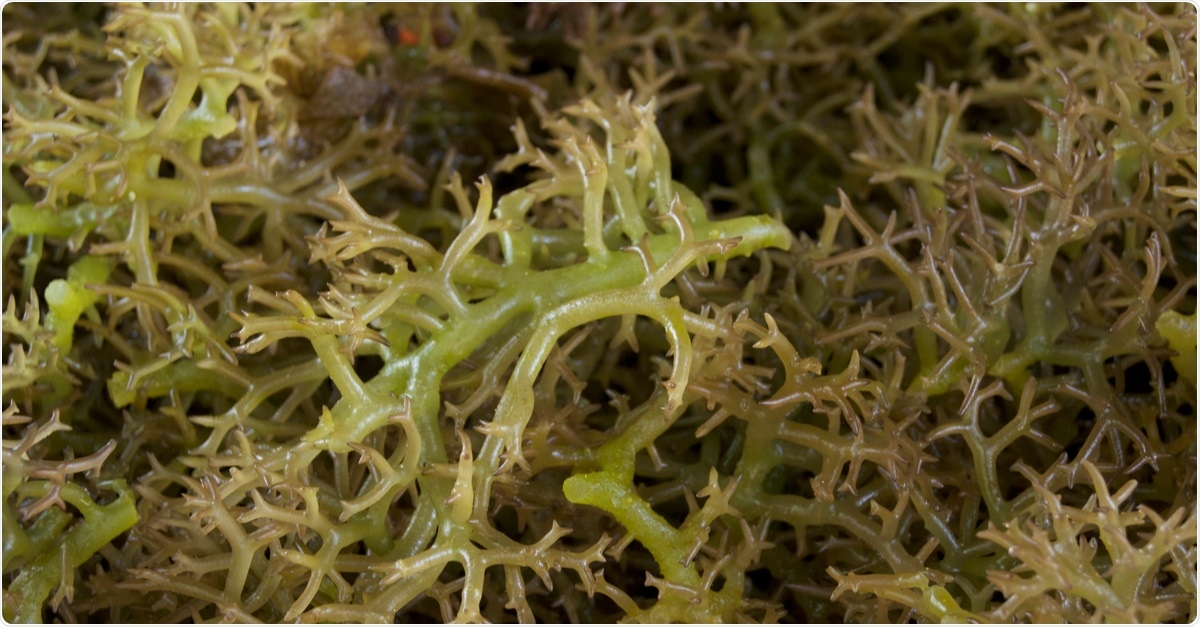The severe acute respiratory syndrome coronavirus 2 (SARS-CoV-2) virus particles typically access the human body through the nasopharyngeal route. Blocking SARS-CoV-2's nasal cavity access by pharmacological means could therefore be an effective preventative strategy that might help reduce its spread.
A team of researchers at the University of Birmingham in the United Kingdom formulated a spray that contains polysaccharides known for their mucoadhesive antiviral properties for prophylaxis against SARS-CoV-2 infection.
The study, which appeared on the preprint open-source bioRxiv* server, shows that carrageenans could be formulated as a nasal spray to prevent infection with SARS-CoV-2.
What are carrageenans?
Carrageenans are polysaccharides produced by red algae. They were discovered six hundred years ago in Carraghen, Ireland. Since then, they have been used as thickeners and food stabilizers. At present, they are also used in the cosmetic, pharmaceutical, and food industries.

Image of fresh seaweed for carrageenan. Image Credit: Naz Images / Shutterstock
More than sixty years ago, scientists began testing the antiviral properties of carrageenan. In vitro and animal studies have shown that carrageenans inhibit different enveloped viruses, including the human papilloma, influenza A H1N1, human immunodeficiency virus (HIV), influenza B virus, dengue, hepatitis A, enterovirus, and some coronaviruses, among others.
The carrageenan works as an electrical barrier, which can bind to virus particles. The virus particle envelope contains positively charged proteins, while the carrageenan has a negative charge.
As a result, the carrageenan will prevent the virus from binding to the angiotensin-converting enzyme 2 (ACE2) receptors, the site where SARS-CoV-2 fuses with and infiltrates host cells. Carrageenan can also catch viral particles released by the cells that have already been infected, preventing further spread.
Nasal spray for COVID-19
Airborne pathogens pose high risks in contraction and transmission within respiratory pathways, particularly in the nasal region. Though airborne transmission of pathogens has long been known, few interventions can protect the body or prevent further spread.
The nasal passage plays an imperative role in frontline defense, filtering harmful bacteria and viruses. Formulating medicines and devices that can regulate and protect the nasal passages are needed.
Nasal sprays can help in preventing viral infections that could enter the nasal region. Specific characteristics are present in these devices, including mucoadhesion, coverage, longevity, and controlled delivery.
Polysaccharides provide perfect polymeric candidates since natural polymers demonstrate biocompatibility and have been approved by the U.S. Food and Drug Administration (FDA). Hence, scientists will not spend a hefty amount of time or funds throughout the development process.
In the current study, the researchers formulated a spray containing a composite mixture of two polymers: gellan and Lambda-carrageenan.
The researchers evaluated the nasal spray's ability to prevent the virus's contraction and transmission by two treatment regimens.
First, they treated the virus with the compound before infecting cells.
The team revealed that spray systems showed highly potent antiviral capabilities, resulting in complete inhibition of the virus when studied for both prophylaxis and prevention of spread.
They found that those treated with carrageenan-treated systems showed no signs of infection.
Next, they showed the mechanism of inhibition of SARS-CoV-2, with the potential removal of the virus via trapping within the sprayed layer and being eliminated through natural pathways.
"This study has demonstrated the formulation of a potent antiviral nasal spray, with not only prophylactic capacity, but the ability to prevent viral transmission. Its ability to completely inhibit infection is derived from the chemistry (sulfated polymer backbone) of the active polymer, carrageenan," the team concluded in the study.
The team also emphasized the importance of understanding each polymer's role in the composite to help future endeavors in developing preventative medicines for SARS-CoV-2.
COVID-19 crisis
With the surging number of cases worldwide and vaccines still await final approval, finding a speedy and cost-effective method to prevent infection is highly essential. If approved for use, the nasal spray could potentially help mitigate SARS-CoV-2 infection and transmissibility.
The global case toll has now topped 56.27 million cases, and the COVID-19 pandemic has claimed more than 1.34 million deaths.
The United States remains the nation with the highest number of cases and deaths, reaching 11.52 million cases and 250,000 deaths, respectively.
Since lockdown measures were lifted a few months ago in many parts of the world, many countries report a second wave of cases, including countries badly hit during the first wave. These include the United Kingdom, Germany, Italy, and France.

 This news article was a review of a preliminary scientific report that had not undergone peer-review at the time of publication. Since its initial publication, the scientific report has now been peer reviewed and accepted for publication in a Scientific Journal. Links to the preliminary and peer-reviewed reports are available in the Sources section at the bottom of this article. View Sources
This news article was a review of a preliminary scientific report that had not undergone peer-review at the time of publication. Since its initial publication, the scientific report has now been peer reviewed and accepted for publication in a Scientific Journal. Links to the preliminary and peer-reviewed reports are available in the Sources section at the bottom of this article. View Sources
Journal references:
- Preliminary scientific report.
Moakes, R., Davies, S., Stamataki, Z., and Grover, L. (2020). Formulation of a composite nasal spray enabling enhanced surface coverage and prophylaxis of SARS-COV-2. bioRxiv. https://www.biorxiv.org/content/10.1101/2020.11.18.388645v1, doi: https://doi.org/10.1101/2020.11.18.388645
- Peer reviewed and published scientific report.
Moakes, Richard J. A., Scott P. Davies, Zania Stamataki, and Liam M. Grover. 2021. “Formulation of a Composite Nasal Spray Enabling Enhanced Surface Coverage and Prophylaxis of SARS‐COV‐2.” Advanced Materials 33 (26): 2008304. https://doi.org/10.1002/adma.202008304. https://onlinelibrary.wiley.com/doi/10.1002/adma.202008304.